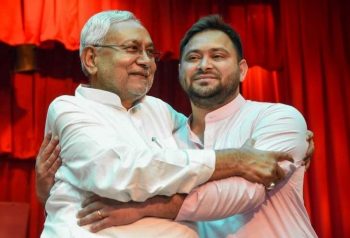
.png) Dr Suresh Mathew
Dr Suresh Mathew

It was on the wee hours of October 24, 1990, then BJP president L. K. Advani’s Rath Yatra to Ayodhya was stopped at Samastipur in Bihar on the orders of Chief Minister Lalu Prasad Yadav. Ironically, three decades down the line, it seems Bihar is taking the lead in stopping the BJP’s ‘unstoppable’ march decimating opposition parties in many states.
Chief Minister Nitish Kumar’s decoupling his Janata Dal (United) from the BJP-led NDA and forming the government with the support of Rashtriya Janata Dal and others has taken the wind out of the saffron party’s sails. Though the general elections are more than one-and-a-half years away, yet the dramatic developments in Bihar have apparently upset the BJP’s applecart. The party had put up stellar performance in the last two Lok Sabha elections, making its passage to the Centre easier. But, with Nitish Kumar pulling the rug from under the feet of the BJP, the fate of the party in Bihar, a part of the Hindi heartland, seems to be on a shaky wicket.
One of the oft repeated topics by Prime Minister Narendra Modi is ‘cooperative federalism’. The system stands for cordial relationship between the federal and the state governments in which both work together. But the BJP’s hunger for power has turned ‘cooperative federalism’ on its head in state after state through one of the following ways.
First, despite having fewer seats than the single largest party, the BJP has formed governments in some states by hook or crook. Second, the party has induced the MLAs of other parties to shift their loyalties en masse, enabling it to form the government with the help of the turncoats. Third, in states like Karnataka and Maharashtra, it apparently played a pivotal role in splitting the ruling party, making the anti-defection law a scarecrow, and managed to come to power. These undemocratic ways have put an axe to the ‘cooperative federalism’, making it a principle more honoured in breach than in observance.
It seems Nitish Kumar, a shrewd politician who has weathered many a storm, sniffed the danger of replicating the ‘Shinde model’ that was used to topple the Shiv Sena-led government in Maharashtra. Many BJP leaders have been coming out with covert messages in their speeches that sent alarm bells ringing in regional parties. At a recent meeting in Patna, BJP chief J. P. Nadda is reported to have questioned the future of regional parties. BJP’s top leader Amit Shah too made remarks that sent ripples in the regional parties’ minds. Nitish Kumar’s decision to dump the BJP is a fall-out of the existential fear that gripped his party in the wake of the aggressive expansion plans of the saffron party.
Political convenience makes politicians go to any extent. The BJP seems to have forgotten its ‘coalition dharma’ which has become byword in the last couple of decades in the parliamentary democracy of India. Respect for each other among the coalition partners is the cornerstone of the success of such governments. The coalition partners in the NDA have slowly realized that the BJP as a partner is dangerous, forcing them to leave the alliance one by one. The BJP is left with no major alliance partner in the Hindi heartland. Though 2024 is not at the doorstep, the shrinking NDA should send out strong warnings to the BJP.